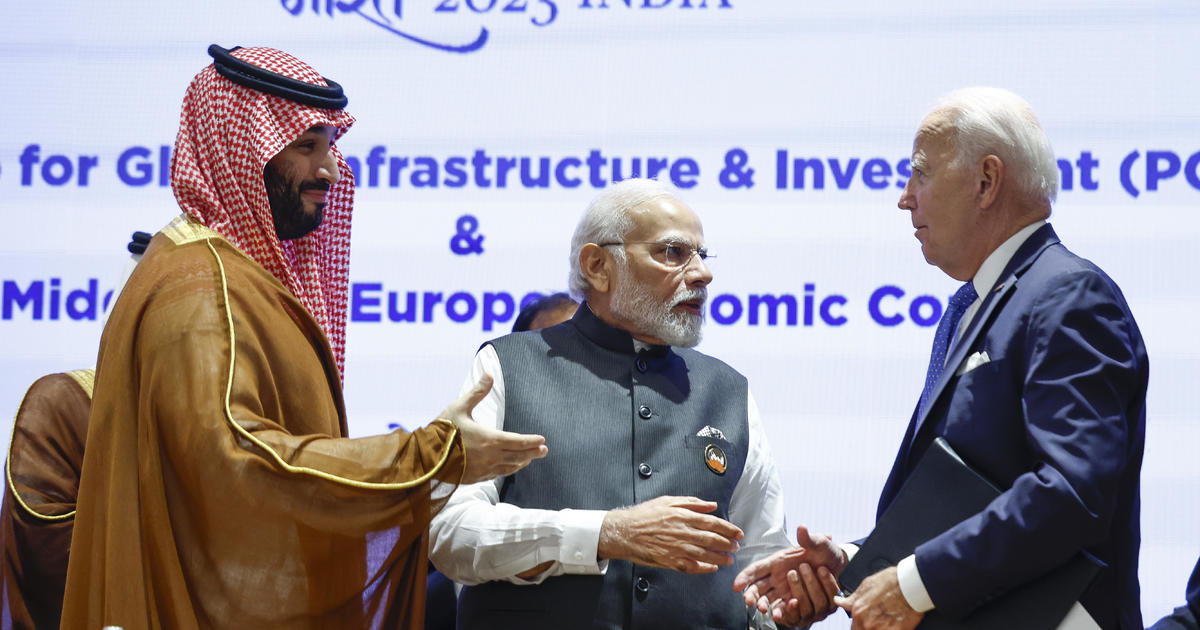President Joe Biden and his allies on Saturday announced plans to build a rail and shipping corridor linking India with the Middle East and Europe, an ambitious project aimed at fostering economic growth and political cooperation.
“This is a big deal,” said Biden. “This is a really big deal.”
The corridor, outlined at the annual Group of 20 summit of the world’s top economies, would help boost trade, deliver energy resources, and improve digital connectivity. Jake Sullivan, Biden’s national security adviser, revealed that it would involve India, Saudi Arabia, the United Arab Emirates, Jordan, Israel, and the European Union.
Sullivan described the network as a reflection of Biden’s vision for “far-reaching investments” that result from “effective American leadership” and a willingness to work with other nations. He stated that the improved infrastructure would drive economic growth, promote unity among Middle Eastern countries, and establish the region as a center for economic activity, rather than a source of conflict.
Indian Prime Minister Narendra Modi, European Commission President Ursula von der Leyen, and other global leaders joined the announcement.
The rail and shipping corridor will physically connect a vast stretch of the globe, enhancing digital connectivity and facilitating greater trade, including in energy products like hydrogen. While the White House did not provide a timeline for completion, the corridor presents a tangible and ideological alternative to China’s nation-spanning infrastructure program.
The project’s cost and financing details have not been disclosed, but Saudi Arabia’s Crown Prince Mohammed bin Salman mentioned a figure of $20 billion during the announcement, though it’s unclear if that solely applies to their commitment.
Von der Leyen hailed the project as a “green and digital bridge across continents and civilizations,” noting its inclusion of cables for transmitting electricity and data.
She also unveiled a “Trans-African Corridor” connecting Angola’s Lobito port with landlocked areas in the Kananga province of the Democratic Republic of Congo and the copper-mining regions of Zambia.
Biden referred to the African project as a “game-changing regional investment” and praised both projects as significant steps forward.
Amos Hochstein, Biden’s coordinator for global infrastructure and energy security, provided a rough timeline for the next year. In the next 60 days, working groups will develop a comprehensive plan with specific timelines. The initial phase involves identifying areas requiring investment and where physical infrastructure can be interconnected between countries. Hochstein expects to implement the plans within the next year, followed by securing finances and commencing construction.
Sullivan revealed that the project’s development began after Biden’s visit to Jeddah, Saudi Arabia, in July 2022, during which he emphasized the need for greater regional economic integration.
In January, the White House began discussions with regional partners regarding the concept, and by spring, they were drafting maps and assessments of existing rail infrastructure in the Middle East. In May, Sullivan, along with senior White House aides Hochstein and Brett McGurk, met their counterparts from India, Saudi Arabia, and the UAE in Saudi Arabia to finalize the details.
The inclusion of Israel and Jordan in the project is particularly noteworthy since Saudi Arabia and Israel lack diplomatic relations. However, Sullivan clarified that the transportation project is not seen as a precursor to a normalization deal, but rather as a practical endeavor to deliver benefits to their respective populations.
Biden, who attended both G20 sessions on Saturday, highlighted plans for increased investments to address climate change, including domestic incentives for renewable energy. He also expressed concern over the impact of Russia’s war in Ukraine on other nations, leading to rising food and energy costs, as well as higher interest rates on debt.
Volodymyr Zelenskyy, the President of Ukraine, who has been a regular presence at international summits since Russia invaded his country more than 18 months ago, was not invited to this year’s G20. The White House pushed for Zelenskyy’s inclusion at the summit, emphasizing close collaboration with Ukraine.
The summit communique, a joint statement agreed to by all participants, covered various issues, including the war. It reaffirmed the principle that states cannot use force to alter borders, disavowed the use of nuclear weapons, and called for a just peace based on the principles of the United Nations Charter. The communique also stressed the need to end attacks on civilian infrastructure.
During the summit, Biden also discussed his request to Congress for additional funding to the World Bank, which could generate over $25 billion in new lending for economic development.
The broader aim of the White House is to strengthen the G20 as an international forum, despite the absence of Chinese President Xi Jinping and Russian President Vladimir Putin. Biden expressed disappointment over Xi’s decision and stated that it would have been nice to have him there.
Denial of responsibility! Vigour Times is an automatic aggregator of Global media. In each content, the hyperlink to the primary source is specified. All trademarks belong to their rightful owners, and all materials to their authors. For any complaint, please reach us at – [email protected]. We will take necessary action within 24 hours.



